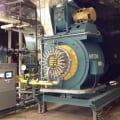Welcome! Here are the website rules, as well as some tips for using this forum.
Need to contact us? Visit https://heatinghelp.com/contact-us/.
Click here to Find a Contractor in your area.
If our community has helped you, please consider making a contribution to support this website. Thanks!
Clocking Boilers/Furnaces Vs. Combustion Analysis
Options
jbrockltd
Member Posts: 2
in Gas Heating
Hey everyone,
Recently I have been listening to a lot of podcasts and hearing alot about clocking and everything during start-ups etc. With my current company I am in residential settings therefore if need be, clocking is something I would easily be able to complete to dial in my unit on a new install or maintenance. That being said most of my work and experience is within commercial settings and as far as I have been taught and know clocking is certainly not something that can be done in most commercial settings.
So my question is,
Is combustion analysis sufficient enough when it comes to assuring an appliance is running properly and not overfiring? Of course without clocking and calculating the numbers I dont have the btu input, but hypothetically speaking is it enough?
thanks,
Recently I have been listening to a lot of podcasts and hearing alot about clocking and everything during start-ups etc. With my current company I am in residential settings therefore if need be, clocking is something I would easily be able to complete to dial in my unit on a new install or maintenance. That being said most of my work and experience is within commercial settings and as far as I have been taught and know clocking is certainly not something that can be done in most commercial settings.
So my question is,
Is combustion analysis sufficient enough when it comes to assuring an appliance is running properly and not overfiring? Of course without clocking and calculating the numbers I dont have the btu input, but hypothetically speaking is it enough?
thanks,
0
Comments
-
You must have listened to the HVAC School podcast on furnace commissioning with Jim Bergmann. HVAC School is an excellent podcast and there was even an episode featuring Dan Holohan himself a while back!
Thanks for asking this question regarding clocking meters in commercial applications, it is something I was wondering about myself.
I work in a commercial setting as well. I always clock meters when setting up power burners or when the manufacturers literature instructs me to do so (I’ve seen some furnaces, power burners, some atmospheric boilers). This can be a real pain in a commercial setting. I have never clocked meters when dealing with RTUs, but this podcast for me thinking that it would be best practice to always clock the meter when starting up new equipment.
To summarize, the process recommended by Mr. Bergmann;
1. clocking the meter to measure calculate input BTU/h to the appliance
2. make fine adjustments to gas pressure to achieve proper input if necessary (3.2”-3.8”)
3. if this is not possible, change the orifices as necessary to achieve proper input
4. perform combustion analysis
This process is being recommended for residential furnaces. Jim points out that under-fired equipment will not perform at the advertised efficiency level.
Does anyone have or use their own portable meter? I suppose you could install on temporarily in-line if it were impractical to shut down every other gas-fired appliance in a building. I’ve heard this may also be more of a thing for propane guys since there usually aren’t meters on propane tanks.
On most mod-con boilers, the startup instructions give an acceptable range for inlet gas pressure and give acceptable O2 and CO ranges (CO2 as well, even though most analyzers are calculating this number based on O2 measurement). Does anyone here regularly clock meters when dealing with mod-cons?1 -
If I had a non-invasive gas flowmeter that I could clip around a pipe (½–4") and which cost less than a grand, I'd use it on every job. Does such a beast exist? I have to admin that I've never even looked for something like that.
On the occasional time I've clocked an appliance, at the mfgr's specified manifold pressure (usually 3½ IN WC) they have always been ±10% the nameplate.
1 -
I do commercial and industrial. One day I might be working on a tiny power burner or atmospheric, the next day I might be working on a 1,500 hp steam boiler for a plant, and the day after that I might be working on a heat recovery steam generator in a cogeneration plant.
I like to clock as much as I can, but it isn’t always practical to do. If it’s a larger burner, I will do whatever necessary to clock it. If the building gas and boiler gas all come off the same meter, I’ll either try to shut gas off to the rest of the building if possible, or clock what the building is using with the boilers off, then subtract that from the boiler clocking. I’d say where I’m at, 90% of the boilers I work on have their own meter, although it’s usually hidden away somewhere in the building and may require a second person to get it done.
The other thing that can make it complicated is in most commercial/industrial settings you have different incoming gas pressures and temperatures, which both need to be accounted for. Luckily some gas meters already do this for you, but not all of them. Some have a spot you can wave a magnet to see what the pressure and temp is. For example, most of Washington DC has 20psi supply gas to buildings. If you were to clock the meter without accounting for that supply pressure, your clocking will be way off.
For smaller burners (mostly on/off) I generally go off of manifold pressure. Once furnace pressure is correct, and draft is correct, you will be pretty spot on with input if you set the manifold pressure properly as the nameplate says.
When going by manifold pressure you must know if the manufacturer is providing that number as gross or net. Gross refers to the total pressure you measure. If they want a gross manifold pressure of 2.5 then you will be looking for 2.5. Net means pressure in addition to. If you have 0.5” of backpressure on the manifold, either from the blower or the furnace pressure, you would add that 2.5” manifold pressure on top of the back pressure. Can you see why clocking is so important? If furnace pressure and draft change, so could your input.
I would try to clock as much as you can. Once you do it more often it becomes less of a chore.Never stop learning.1 -
Clocking meters will never tell you equipment is operating correctly. If you work on propane or oil it becomes nil. Cubic feet of gas does not tell you how many btus you have. I guess if you actually measure btu output and compare it to usage you can make a approximate estimate of efficiency. Maybe before combustion analyzers it was the best we could do.
Not sure on commercial how you clock meters when there are usually more than one piece of equipment in building?
Combustion analysis is the only way to tell if things are operating safely but not necessarily efficient.
I laugh when I hear you just run out to your truck a grab a handful of burner orifices so you can change them on every furnace. Not going to happen.
Natural gas is only 90% carbon or sensible heat. So if you have non-condensing equipment and you have 100 cu.ft. of gas your actual input (sensible) is 90,000 btus. Now that is potential energy. To produce 90,000 btus of usable heat (thermal energy) you would have to have a 3600 degree flame temperature. Typical flame temperature at 6% O2 is 2800 degrees or about 90% thermal energy. So what is your actual produced thermal energy? 81,000 btu input. You will never get non-condensing equipment to perform up to its rated output at factory settings.
There is a lot more to the combustion process than clocking meters and checking gas pressure and changing orifices.4 -
Appreciate the replies from you guys. Its definitely a good conversation to bring up. The challenging part of this trade is money. Im the kind of tech that always wants to ask questions, and make sure im doing the best job I can be, and continue to learn and adapt. The problem in the field is that sometimes you are just not able to be as thorough or utilize the practices you would like to because your working for a company that thinks its pointless, or says the customer will not pay, and also says they wont get jobs if they quote with combustion analysis etc etc. Im sure many of you have heard this all before.
In a commercial setting for example, 2 boilers on a rooftop mechanical room (20 storey building). Each suite has natural gas appliances. This makes clocking quite a difficult and costly task.
So does everyone agree that combustion analysis is satisfactory if clocking is not realistic?
Sure, you wont necessarily have the btu input of the appliance, but I would think that as long as your CO/O2 readings are within the manufacturers specs as well as manifold pressure that the unit should be A-okay?? Is that fair to assume??1 -
Not sure manufacturers list O2 readings unless they are Mod-Cons. O2, CO and Flue Temps are all important. What kind of boilers?
If the flue temperature a Mod-Con boiler is lower than the incoming return water, are the flue gases heating the water or is the water heater the flue gases?0 -
In 11 years I’ve never worked on a commercial burner/boiler that did not list O2/CO/CO numbers. You can’t tell input off of O2 readings. Could be running at half input but still have correct O2 reading. But yes, if specified manifold pressure is pretty close along with stack temp (at operating temp) is in range you’re probably in the ballpark for input.Never stop learning.0
-
OH MY GOD
FOLLOW THE INSTALLATIONS INSTRUCTIONS THAT CAME WITH THE UNIT
PLEASE0 -
At some risk of pointing out the obvious... you're talking apples and oranges here, and it isn't the one vs. the other, but two completely different things.
Clocking the burner -- or obtaining the fuel flow rate in some other way -- will tell you one thing, and one thing only: your gross BTU input. This may be a nice number to know, but...
Doing a combustion analysis, together with stack temperature, however, will tell you how close you are to having a proper air/fuel ratio, and thus how well the burner is adjusted and how clean and to a large extent how efficiently it is running. Not the same thing at all.Br. Jamie, osb
Building superintendent/caretaker, 7200 sq. ft. historic house museum with dependencies in New England1
Categories
- All Categories
- 87.5K THE MAIN WALL
- 3.3K A-C, Heat Pumps & Refrigeration
- 61 Biomass
- 430 Carbon Monoxide Awareness
- 122 Chimneys & Flues
- 2.1K Domestic Hot Water
- 5.9K Gas Heating
- 118 Geothermal
- 170 Indoor-Air Quality
- 3.8K Oil Heating
- 78 Pipe Deterioration
- 1K Plumbing
- 6.6K Radiant Heating
- 395 Solar
- 15.9K Strictly Steam
- 3.5K Thermostats and Controls
- 57 Water Quality
- 51 Industry Classes
- 51 Job Opportunities
- 18 Recall Announcements




